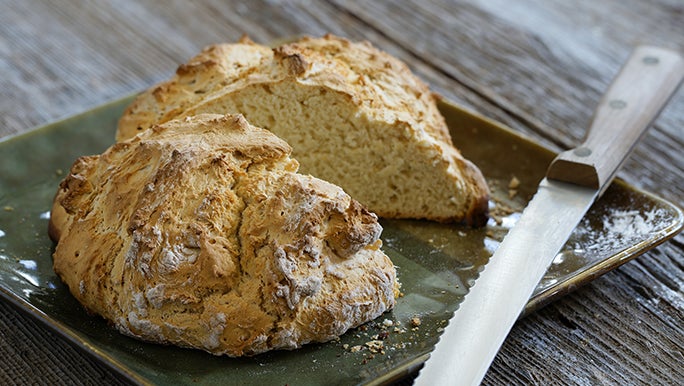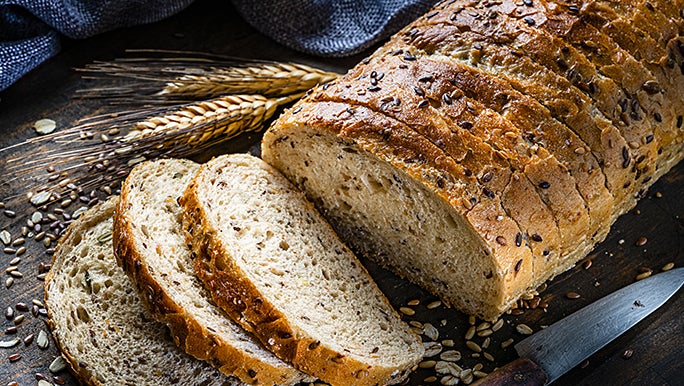Key points
- Bread is part of a nutritious balanced diet.
- Wholegrains are the main ingredient to look for when choosing.
- Unless you have been medically diagnosed with Coeliac Disease, wheat allergy, and non-coeliac gluten sensitivity, eating wheat or gluten shouldn't be a problem for your immune system.
With shelves and shelves of different types, flavours, additions or subtractions, shopping for bread can be mind-boggling. When you add in the myths such as ‘bread makes you fat’ and ‘gluten is bad’, it's hard to know what the correct choice is.
With guidance from our Registered Nutritionist Sarah Gray, we’ve looked at some of the more popular bread to see what a healthier choice could be. We also explore whether a gluten free diet is beneficial for the immune system.
What’s the deal with bread?
Bread has often been labelled as the baddie thanks to myths, but it's not as simple as that. As Sarah notes, eating any food or nutrient in excess isn’t likely to be good for you.
So, if you’re thinking you need to avoid bread, move away from that idea. Consider what are the healthier ways you could include bread in your overall weekly family meal plan.
A common concern when it comes to bread is should we eat gluten free to improve our immune system?
Sarah says “People with diagnosed coeliac disease (CD), wheat allergy, and non-celiac gluten sensitivity, have been shown to have a heightened immune sensitivity to wheat and/or gluten. The immune system essentially overreacts to gluten, which leads to issues with absorbing nutrients in the small intestine.”
If you don't have a relevant medically diagnosed condition, gluten should not have this kind of effect on your insides. “You can't give yourself a gluten intolerance,” Sarah reassures us.
If you have concerns about your immune system, these 10 facts about the immune system might answer your questions.
If you think you may have bowel problems, it's always a good idea to check with your health professional before making any major changes to your diet.

Breads like damper and soda bread can be healthier alternatives to plain white bread.
So, bread can actually be good for me?
Potentially yes. As with anything, it's all about the details.
While it’s OK to eat white bread, there are other choices out there depending on the needs of your family. For example, if your children will only eat white bread, check out the options that have hidden fibre or added nutrients. There’s no point trying to force them to eat dark rye bread just because it might have extra health benefits.
If you just cut out bread completely, you could be missing out on important nutrients and the dietary fibre that is needed to feed the good bacteria in your gut (also known as the gut microbiome). These microorganisms are being linked to other health areas such as the immune system.
So, if you focus on a bread option that has more nutritional benefits to support your gut microbiome, you could potentially be helping to support your immune system.
That dietary fibre also acts like a broom for your intestines, helping to keep things moving through your system and everything healthier.

If you cut out bread completely, you could be missing out on important nutrients.
Tips to help choose the right bread for you
Choose wholegrains or wholemeal
- Look for bread that contains wholegrain or wholemeal. Some multigrain breads can be made with white flour with the grains added.
- Wholemeal wholegrain has the wholemeal flour and the grains, for the extra oomph of goodness.
Go with the grainy ones
- Grains and seeds may make the bread more nutritious and have a lower GI than others.
- “Wholegrains contain protein which can help you feel full, so you’re less likely to snack between meals,” adds Sarah.
Try sourdough
- Sourdough is made using wild yeast which rises more slowly, increasing its potential health benefits.
Go old school
- Breads like damper and soda bread can be healthier alternatives to plain white bread.
Mix it up
- Middle eastern style breads like flat bread or pita bread are nice alternatives to chips or sliced bread. Look for wholemeal varieties and try them toasted, dipped in hummus or as a pita pocket stuffed with a mixed salad.
Choose a healthier sweet option
- Certain breads are commonly made with added sugar, making them a bit lower on the healthy list. Loaves like cinnamon bread and raisin toast may be a healthier sweet choice when eaten in moderation and supported with a balanced diet. Look for wholemeal varieties.

Bread has often been labelled as the baddie thanks to myths, but it's not as simple as that.
No need for bread guilt
Bread is not the enemy. So don’t feel bad if you enjoy some freshly baked bread now and then. Consider all the bread options available to you and make the decision that best suits your family’s needs.
If there’s a type of bread you aren’t sure you’ll like, consider trying it. You never know what new tastes you might enjoy.
Related:
Sarah Gray is both a Registered Pharmacist and Registered Nutritionist with a particular interest in health education and helping people to take small steps to big change in their health journey. Sarah is the Head of Health and Nutrition on the healthylife Advisory Board.
Reviewed by the healthylife Advisory Board September 2021.



